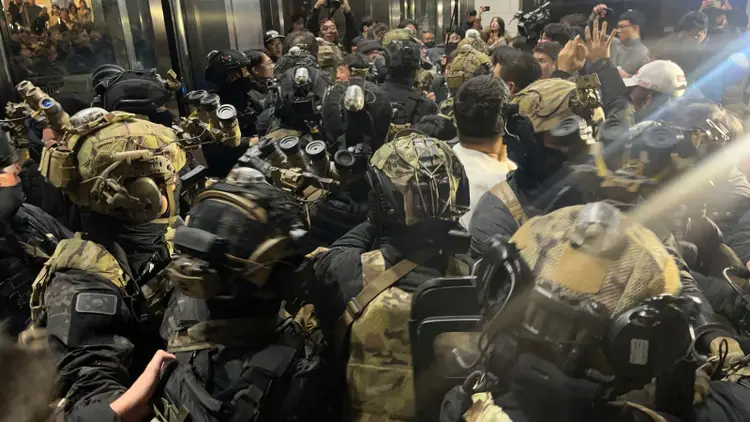Why was martial law declared in South Korea?

South Korean President Yoon Suk Yeol has removed the military control he had put in place just hours before, surprising lawmakers, the general public, and foreign partners.

In a speech to the nation, the president announced, "I have agreed to the National Assembly's choice to disband and end the state of martial law."
Members of Parliament, including some from the ruling party, voted against the declaration as demonstrations erupted in violence between protesters, soldiers, and police following the martial law announcement.
So, what exactly is martial law, and what prompted the president to implement it?
What exactly is martial law?
It establishes a short-term military rule, typically implemented during periods of conflict, unrest, or major natural emergencies.
During martial law, the military leader holds complete power to create and implement laws.
It puts all current laws on hold, which implies that regular civil rights may be temporarily set aside, and military law could be applied to civilians.
This action is taken when it's determined that the civilian leaders are unable to carry out their duties.
The unexpected decision marked the first implementation of martial law since the country transitioned to democracy in 1987.
Martial law is usually meant to be a short-term measure, but it can last for an extended period. It is commonly enforced during wartime or during emergencies like civil disturbances and natural disasters.

A recent instance of martial law being implemented occurred in Ukraine after Russia launched its large-scale invasion.
What motivated the president to bring it forward?
In his announcement on Tuesday evening, Yoon Suk Yeol emphasized that it was essential for protecting the nation's constitutional framework.
Mr. Yoon stated, "I am implementing martial law to safeguard the democratic Republic of Korea from the dangers posed by North Korean communist forces. This action aims to eliminate the reprehensible pro-North Korean groups that are undermining the freedom and well-being of our citizens, as well as to defend our constitutional system."
This decision followed two years of Mr. Yoon facing difficulties in advancing his initiatives in a parliament led by the opposition.
His conservative People Power Party is currently at an impasse with the liberal Democratic Party regarding the budget proposal for the upcoming year.
On Monday, ministers voiced their opposition to the Democratic Party's decision to cut over four trillion won (about £2.1 billion) from the government's budget plan.

South Korea Military Control: Stay updated with live news.
For better video playback, please use the Chrome browser.
Mr. Yoon remarked that this action disrupts the fundamental operations of government administration.
The president has also rejected requests for impartial inquiries into controversies related to his wife and senior officials, which has led to criticism from his political opponents.
Security and defense expert Professor Michael Clarke shared with Sky News his view that Mr. Yoon's move to impose martial law was an effort to undermine his political rivals.
"Yoon has been at the helm of a minority government for a while, and the Democratic Party has consistently obstructed his efforts," Clarke mentioned.
He has chosen to take the initiative against his rivals by making this move.
"What liberal democracy really doesn't need right now is for one of the Asian democracies to devolve into a temporary dictatorship."
How did people respond?
Prior to the president's decision to lift martial law, opposition leader Lee Jae-myung described the declaration of martial law as "against the constitution" and urged the public to demonstrate outside the parliament.
The parliament, run by the opposition party, decided to prevent the president's choice, which he overturned only a few hours afterwards.
In South Korea, the law states that the government is required to end martial law if most members of the National Assembly call for it through a vote.
Live television coverage from earlier today captured South Korean parliamentary staff confronting martial law troops, using fire extinguishers to fend them off amid a struggle between the public and law enforcement.



























































